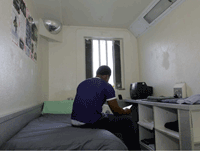
Local authorities across the country are failing to divert looked-after children from “the dreary, damaging route from care to custody”, according to research published today.
A report by the Prison Reform Trust and the National Children’s Bureau, based on interviews with young people in prison, found care was a stepping stone to custody for a disproportionate number of looked-after children.
Although less than 1% of children in England are in care, more than a quarter of boys and half of girls in young offender institutions have been in care, the report stated.
Juliet Lyon, director of the Prison Reform Trust, said: “Let down by families and local authorities alike, far too many children find themselves on the dreary, damaging route from care to custody. Too often the state proves to be a poor parent as the tiny minority of children in care become the substantial number behind bars.”
The care system had more potential than the justice system to prevent offending by looked-after children, the report found. It urged corporate parents to treat looked-after children “as any other parent would”, visiting them regularly in prison and making plans for their release at the earliest possible opportunity.
Local authorities should allow children to remain in placements where they are happy, involve them in decisions which affect their lives and protect them from frequent changes in social work staff, the report recommended.
Even basic changes would make a huge difference, young people said, such as stable home placements and feeling that at least one adult cares about what happens to them.
In his foreword to the report, Lord Laming said: “It is a huge step for the state to assume the parenting of a child or young person. With that comes the responsibility to provide stability, security and hope for the future. Sadly, the failure to secure proper care and support at this time, so critical in the development of the child, results in the continuation of the downward spiral towards imprisonment. We must not stand by and allow wasted opportunities to result in wasted later lives.”
Cllr David Simmonds, chairman of the Local Government Association’s Children and Young People Programme Board, said: “While statistics show that looked-after children are disproportionately likely to end up in custody, these problems do not arise solely because of the care system. Many of the problems facing these children are deep rooted and we cannot pretend that these issues are easy to deal with.
“Frontline social workers save lives, and change lives for the better,” he added. “They should be viewed as part of the solution, not the problem. However, they cannot do this difficult work alone. Joining up council services with the criminal justice sector would not only help these youngsters but will also help protect the communities that they live in.”
Simmonds said the LGA was working with councils to “continuously challenge and learn from each other to further improve children’s services”.
What do you think? Join the debate on CareSpace
Keep up to date with the latest developments in social care. Sign up to our daily and weekly emails
Related articles
Young offenders on remand to be given looked-after status
The rise of the social worker in young offender institutions
Inform subscribers: Guide to youth justice: prevention programmes and interventions


 Bournemouth, Christchurch and Poole
Bournemouth, Christchurch and Poole  Hampshire County Council
Hampshire County Council  Lincolnshire County Council
Lincolnshire County Council  Norfolk County Council
Norfolk County Council  Northamptonshire Children’s Trust
Northamptonshire Children’s Trust  South Gloucestershire Council
South Gloucestershire Council  Wiltshire Council
Wiltshire Council  Wokingham Borough Council
Wokingham Borough Council  Children and young people with SEND are ‘valued and prioritised’ in Wiltshire, find inspectors
Children and young people with SEND are ‘valued and prioritised’ in Wiltshire, find inspectors  How specialist refugee teams benefit young people and social workers
How specialist refugee teams benefit young people and social workers  Podcast: returning to social work after becoming a first-time parent
Podcast: returning to social work after becoming a first-time parent  Podcast: would you work for an inadequate-rated service?
Podcast: would you work for an inadequate-rated service?  Family help: one local authority’s experience of the model
Family help: one local authority’s experience of the model  Workforce Insights – showcasing a selection of the sector’s top recruiters
Workforce Insights – showcasing a selection of the sector’s top recruiters 

 Facebook
Facebook X
X LinkedIn
LinkedIn Instagram
Instagram
Comments are closed.